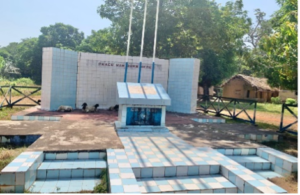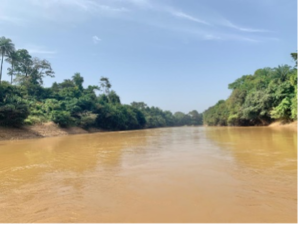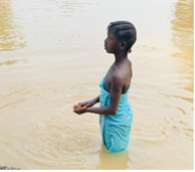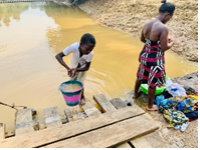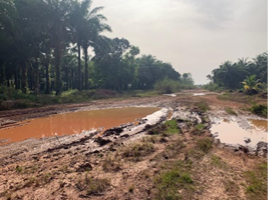By patricia.ngevao@awokonewsaper.sl
Significance of Kumrabai Ferry
Freetown, SIERRA LEONE – Kumrabai Ferry, a village in Sierra Leone’s Tonkolili District, stands as an enduring symbol of peace, notably marked by a pivotal meeting on 8th December 2000, when Lieutenant General Daniel Ishmael Opande, Force Commander of United Nations Mission in Sierra Leone (UNAMSIL), Brigadier General Alhassan, Commander Sector (4), and General Issa Sesay, Interim Chairman of the rebel Revolutionary United Front (RUF), convened for the first time. Their objective was to discuss the deployment modalities of UNAMSIL troops throughout RUF-controlled regions in Northern and Eastern Sierra Leone.
This historic meeting became a cornerstone in the broader peace process, leading to the deployment of UNAMSIL troops across the country and the subsequent disarmament of all combatants in Sierra Leone.
Peace Monument constructed by two Bangladesh engineers, dating back to December 12, 2002.
The Peace Monument commemorates the contributions of Lieutenant General Opande, Brigadier General Alhassan, and General Sesay towards fostering peace in Sierra Leone. The meeting witnessed a commitment from UNAMSIL and RUF leadership to a peaceful resolution of the conflict, orchestrated under the leadership of Sesay.
Unravelling Neglect
Despite its historical significance, the village faces neglect today. In recent years, it has been at a crossroads, struggling with harsh realities and most especially the aftermath of mining ventures on its water sources.
The community’s cry for help goes unnoticed, sparking a crucial inquiry. Examining the issue, this piece reveals a complex connection between the neglect of Kumrabai Ferry, water contamination from mining, and a lack of development efforts. This underscores the residents’ concerns, emphasizing the pressing need for solutions.
Struggle with Contaminated Water
“Earlier this morning, my 10-year-old daughter has been disturbed with symptoms of persistent vomiting and frequent stool,” Mohamed Kanu, the town chief of Kumrabai Ferry told Awoko Newspaper with a sad face.
“Her elder brother has just rushed with her to the hospital,” he concluded with a weary voice. Kanu’s daughter is one of the hundreds of residents affected by polluted drinking water in Kumrabai Ferry.
Another resident, Hassan S. Yatteh, shared his observation of the local water on his skin when he began bathing with it. “I am naturally sensitive to changes in my skin,” he explained to Awoko. He recounted noticing this five years ago upon relocating to Kumrabai ferry to be with his family. Initially, according to him, he did not take it seriously, but the consequences became evident when he started experiencing skin diseases.
A glimpse of Kumrabai Ferry’s polluted waters
Awoko spoke with a mother, Yahdama Conteh, whose eyes mirrored a mix of pride and profound sorrow. She shared the disheartening tale of her son, who, unable to bear the burden of using the water available in the village, had chosen to seek refuge in the city.
“It is sad that my son’s migration is not propelled by dreams of seeking job opportunity in the city but by the stark reality of water quality,” she said, stressing that Kumrabai’s struggle for a resource is one that should be abundant and pure.
A girl bathing in the polluted waters
Another, Alie Kamara, expressed his distress over the situation. Lamenting that life took a drastic turn for him after losing his son to cholera, he raised serious concerns about the health of other residents still exposed to the contaminated water, highlighting the urgent need for addressing the water crisis in Kumrabai.
A boy fetching the contaminated water for survival while a lady is doing laundry in it.
During the investigation, the presence of a well in the community was spotted by Awoko. According to local residents, while they use water from this well, it is not entirely clean. In an attempt to address this, they resort to letting the water settle, hoping that sediment and contaminants will sink to the bottom. Unfortunately, this well occasionally runs dry, leaving them with no choice but to fetch water from polluted sources.
Global Efforts
The World Health Organization (WHO) is a key player in global efforts for clean water access. Through initiatives like the Guidelines for Drinking-water Quality, it works to safeguard public health by providing a framework for countries to ensure water safety. International agreements, like the UN’s Sustainable Development Goals (SDGs), specifically Goal 6, aim to achieve universal access to sustainable water and sanitation by 2030, addressing poverty, health, and sustainable development.
The 2023 report from Minority Rights Group International (MRGI) focuses on water access, highlighting its impact on health, livelihoods, and recreation. The term “hydro-citizenship” is introduced to depict the intricate link between water and human well-being. Unfortunately, discrimination exacerbates water poverty for minorities and indigenous peoples globally, influenced by environmental, political, and social factors.
Despite efforts, achieving the “clean water and sanitation for all” goal by 2030 remains distant, as stated in the 2023 Water Conference report. Dr. Charlotte MacAlister, stresses the need for policy discussions in the remaining seven years of the Water Action Decade, highlighting that the focus on mitigating water scarcity has hindered progress toward SDG 6, as per the UNU INWEH report.
Various international agreements, such as the Convention on the Rights of the Child (CRC) and the Convention on the Elimination of All Forms of Discrimination Against Women, (CEAFDAW) indirectly address water access by recognizing the right to an adequate standard of living, encompassing access to clean water.
Collaborative Efforts
In an interview with an environmental advocate, Stonison Tamba Kortu, who is the head of Sustainable Water, Environmental Sanitation and Hygiene for All (SWESHA), he highlighted crucial strategies to combat water pollution stemming from mining activities.
Emphasizing the pivotal role of environmental organizations, Kortu urged the implementation of stringent regulations, the promotion of sustainable mining practices, and the initiation of awareness campaigns.
The activist underscored the significance of public involvement, encouraging individuals to stay informed, support eco-friendly mining initiatives, actively engage in community clean-up events, and advocate for policymakers to prioritize water protection measures. SWESHA’s comprehensive approach aims to foster collective efforts in safeguarding water resources and promoting a sustainable future.
Ibrahim Satti Kamara, Director of Communications and Public Relations for National Minerals Agency (NMA), emphasizes commitment to robust regulations, stating, ‘Our focus is on controlling pollution by strictly overseeing waste disposal, chemical usage, and treatment methods in mining operations.’
He lamented on the importance of monitoring, saying, “Regular inspections and water sampling are crucial tools ensuring strict compliance with water quality standards, with penalties in place for any violations.”
Recognizing challenges, the director added that balancing economic interests while promptly addressing non-compliance is a delicate task due to resource constraints.
Ongoing efforts are stressed by the communication head, who notes, “We continuously assess and update regulations to address potential gaps, ensuring the ongoing protection of our water resources.”
Engaging those involved in Mining Activities
Throughout the investigative process, exhaustive efforts were undertaken to gather information from both companies and individuals involved in mining activities within the designated area. Despite diligent attempts, no substantial information was obtained.
Nevertheless, in the spirit of fostering transparency and comprehensive understanding, an open invitation is extended to the aforementioned engaged in these activities.
Missing Amenities
Beyond its polluted waters, the village grapples with a multitude of challenges including bad roads, absence of a hospital or primary healthcare facility and the absence of schools.
In a heartfelt interview, a resident of Kumrabai Ferry, Pa Brima Conteh, lamented the persistent challenges posed by the dilapidated roads in their village. With a sigh, he described the daily struggles of navigating through pothole-ridden paths, highlighting how these rough terrains have become formidable barriers to progress.
Noting how the poor road conditions hinder not only the flow of goods and services but also dampen the prospects of local businesses, Conteh emphasized the adverse impact on transportation and economic activities.
Potholes and Pitfalls
“I kindly urge the government to address this critical issue,” he said, underscoring that improved infrastructure is not just about smoother roads but is integral to unlocking the true potential and prosperity of the village.
“During the pregnancy of my first and second child, I walked eight miles away from this village to access medical care. Most often get exhausted from long walk because I cannot afford money for a motorbike,” said Maseray Tholley, a mother of four and also the women’s leader of Kumrabai.
According to Madam Tholley, many of the women have undergone miscarriages due to long distance in accessing medical care. With a touch of vulnerability in her voice, she underscored the urgent need for a local health center, emphasizing the toll it takes on the well-being of the villagers. “Healthcare infrastructure is not just a matter of convenience but a fundamental necessity for preserving and improving the quality of life in Kumrabai Ferry,” said the women’s leader.
In addition, another concerned resident of Kumrabai Ferry, Sullay Kuyateh, laid bare the challenges posed by the absence of schools in their village. With a genuine tone, he spoke of the daily struggle endured by pupils, who embark on an eight-mile journey to access the nearest school. Detailing the hardships faced during this lengthy trek, Kuyateh emphasized the toll it takes on the children’s education and overall well-being.
He fervently appealed for the establishment of local schools, highlighting the transformative impact it would have on the younger generation, sparing them from exhausting journeys and ensuring they receive the education they rightfully deserve.
Minerals Over Morals
In a candid conversation with Awoko, the Section Chief, Pa Abdulai Kamara, revealed that both individuals and companies engage in mining activities in the area without compensating the community for their challenges. Highlighting the lack of social amenities, he expressed frustration in pleading with the government through visits to stakeholders and media discussions, yet no actions have been taken.
Interestingly, the chief encourages his people to vote during elections, emphasizing it as their right. Notably, while acknowledging the community’s right to safe water and improved basic amenities, he maintained that despite continuous efforts, their cries seem unheard, coining the community’s struggle as “Minerals over Morals.”
However, he remains hopeful for a positive response from the concerned authorities in the future.
World Policies
International policies stress the vital importance of ensuring equal access to essential services for everyone, placing a special focus on minority populations. The Universal Declaration of Human Rights (UDHR) asserts the fundamental right to an adequate standard of living, covering healthcare, education, and infrastructure.
Similarly, the International Covenant on Economic, Social and Cultural Rights (ICESCR) recognizes the universal right to the highest attainable standard of health and education. The United Nations Declaration on the Rights of Indigenous Peoples (UNDRIP) emphasizes indigenous rights to their lands and resources, influencing access to crucial amenities. The SDGs commit to promoting health, well-being, and inclusive education, addressing infrastructure development in Goal 9.
Moreover, global health principles from the WHO advocate for responsive systems that cater to the needs of vulnerable populations. UNESCO’s Education for Sustainable Development encourages nations to pursue inclusive and equitable quality education, considering diverse learner needs. Furthermore, the Convention on the Elimination of All Forms of Racial Discrimination (CEAFRD) calls for ending racial discrimination and promoting understanding among all races.
Addressing Disparities with Inclusive Policies
Addressing concerns about policy implementation, the Minister of Local Government and Community Affairs in Sierra Leone, Tamba Lamina, emphasizes a thorough approach in selecting areas. “The decision is rooted in a comprehensive assessment of needs and challenges to guarantee fair access to essential services across the nation,” said the Minister,
According to him, the Ministry actively engages with minority populations, particularly in often-overlooked areas, seeking their input to represent their unique needs in the decision-making process.
In response to disparities, the Minister affirms the existence of specific plans aimed at addressing healthcare, education, and infrastructure disparities among minority communities. These plans, according to him, are designed to promote equal opportunities and ensure inclusivity for all citizens.
Stating that “Collaborating closely with international frameworks such as UDHR, ICESCR, and SDGs, the Ministry aligns local government efforts to guarantee inclusive and comprehensive policy implementation,” the Minister underscores the commitment to respecting and protecting the rights of indigenous peoples, guided by the principles outlined in the UNDRIP.
Highlighting ongoing initiatives, Lamina noted that specific projects are underway to promote inclusive and equitable quality education, especially in historically overlooked areas.
“The Ministry will actively implement measures to ensure consistent and effective policy implementation across all regions. This involves acknowledging and addressing variations in access to essential services throughout Sierra Leone, demonstrating a commitment to equality and inclusivity,” the Minister affirmed.
Possible Solutions
International collaboration with governments is crucial for effectively translating these policies into actionable measures, especially when addressing the unique needs of minority communities. Despite these global efforts, challenges persist, exemplified by Sierra Leone’s ongoing struggles to implement these policies in areas like Kumrabai Ferry.
Addressing such challenges requires continued collaboration between international bodies and governments to ensure the meaningful realization of these principles, particularly in regions facing difficulties in policy implementation.
Efforts to revitalize Kumrabai Ferry village must begin with addressing the environmental challenges posed by mining activities. Striking a balance between economic development and environmental sustainability is a complex task, but it is essential to ensure the well-being of the communities affected. Mining companies must be held accountable for their impact on local ecosystems, and measures should be implemented to mitigate pollution
Simultaneously, the restoration of its basic infrastructure is paramount. The roads, pathways to progress, must be repaired to reconnect the village with the broader network of opportunities. The education system, a cornerstone of rebuilding society, requires targeted investment to ensure that the children of the village have access to quality education. The healthcare infrastructure, neglected for far too long, must be constructed to provide essential services to the community.
Conclusion
The plight of this village underscores the broader issues faced by post-conflict societies in their quest for sustainable development. The village serves as a cautionary tale, reminding government that the aftermath of war is not merely about signing peace agreements but about the painstaking work of rebuilding communities and addressing the root causes of conflict.
This article has been crafted with support funding from the European Union, facilitated by the Minority Rights Group International (MRGI) and its esteemed partners. This collaborative effort is part of the “Engaging Media and Minorities to Act for Peacebuilding” (EMMAP) project.
Through the EMMAP program, there is a shared commitment to fostering understanding, promoting peace, and empowering minority communities. This collaborative initiative reflects a positive synergy between international organizations, highlighting the impact that such partnerships can have in addressing critical challenges and promoting constructive change. PSN/7/1/2024

